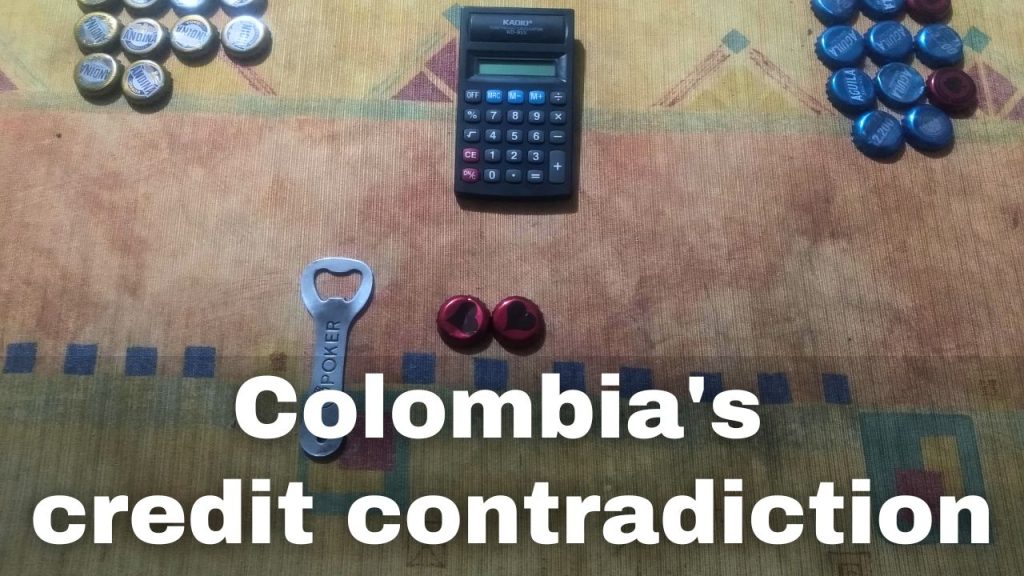Ingresa o regístrate acá para seguir este blog.
[For an audio/vlog version of this story, click here.]
‘We only give credit to those older than 90 and who bring one of their grandparents as a guarantor.’
That’s the English translation of one version of the various we-don’t-give-credit signs you’ll see displayed in many Colombian tiendas, convenience stores that sell products ranging from beer to brushes and much else besides. (Although some tiendas’ chief business line is beverages and sweet and savoury snacks.)
What such signs really mean, of course, is that credit is not given whatsoever. (Perhaps, in a few generations, a 90-year-old might expect his/her grandparents to still be alive. Then again, in a few generations, humanity might be extinct.)
The reality is, however, that in many beer-serving tiendas, no-credit signs on display or not, the payment model in operation leaves the establishment at risk of being what effectively amounts to a moneylender.
Drink now, pay later
This is because the tab system dominates in such environments in Colombia; you pay your bill when you’ve finished imbibing. Rarely will you be asked for payment upfront, as is generally demanded in pubs in Ireland and the UK.
In theory, paying at the end makes more sense than doing so each time you order, particularly when we’re talking about the consumption of multiple beverages.
This is even more so the case in places where cash is still king (working-class Colombia is, thankfully, in that category). It can be cumbersome having to deal with change for each order.
Nonetheless, the tab model can be easily abused, by both the customer and the owner/staff.
The former can do this by simply saying, be it true or not, that he/she doesn’t have enough money to pay the bill.
In a country where the financial situation for many is far from stable, this I-don’t-have-the-cash-right-now defence is commonplace. I’ve seen it cause plenty of beer-fuelled, heated discussions.
That much of working-class Colombia falls into the low-income bracket makes the popular use of the tab system even more of a head-scratcher.
That it persists suggests that businesses feel it’s the best way to operate. They’ll get the money at some stage — as long as the debtor doesn’t die with the bill still outstanding. Or it could be one of those just-how-it-is scenarios that I wrote about before.
Bottle battles
As for tienda owners or staff, they can game the system by adding more products to your tab than were actually ordered.
This abuse is, unsurprisingly, far easier to carry out when the product in question is alcohol and the customer is drinking on-site, getting merry in the process.
I’m not the only one who has questioned the amount owed at the end of a session. It can lead to a tetchy tienda environment, if not to something more untoward.
Linked to all this is the method some tiendas use to keep, um, tabs of the tab.
Counting the bottles consumed is one way, something I see less often these days.
‘If you happen to have a less-than-attentive tienda keeper, bottle-cap counting could work to your advantage.’
This may seem sound — and it explains why bottles are left on a customer’s table until the session has finished — yet a couple of other foreigners and I were the victims of its flaws a few years ago in Bogotá. I wrote about that incident at the time in a blog piece titled, ‘You’ve been had, Bogotá style’.
Summarising that episode, a guy who we’d befriended and who we thought had bought us a few beers actually pulled a fast one on us, or so it seemed.
As he left before us, we ended up being charged for all the beers he’d drunk, even those he’d had before joining our company.
Of course, he could have been — indeed, probably was — in cahoots with the tienda owner. Or the tienda owner might have seen an opportunity to charge for the same beers twice.
As we were in an unfamiliar place, after airing our displeasure we took the financial hit and promptly left, never to return.
Top cap
An alternative accounting approach with tiendas is the bottle cap. For each beer opened, the cap is placed on what we’ll call the payment counter.
This is open to some of the same abuses as outlined with bottle-counting, minus the problem of another customer adding to your bill.
One particular flaw it has is with bottle size and associated price differences.
For example, to use my tipple of choice, Poker, very often the cap on a litre bottle is decorated the same as the 330 ml presentation.
So, if you’re in a round consisting of bigger and smaller bottles of the same brew, you could be deemed to have had more bigger ones than smaller ones when the reality was the reverse.
Now, if you happen to have a less-than-attentive tienda keeper, bottle-cap counting could work to your advantage. ‘Oh no, of those five bottle caps, only two belong to litre bottles, the rest were 330 ml.’ One can plead ignorance if caught out.
Pen power
Slightly more watertight than the aforementioned methods is the radical pen-and-paper approach to tab-keeping.
Yes, some tienda workers write down your name — or some title that identifies you, such as gringo or mono — in a copybook and note your orders as they come. Revolutionary.
Again, it’s not abuse-proof. If you lose track of what you’ve had, a few additional beers might be added to your tab. (And yes, this isn’t exclusive to rudimentary tiendas. It can happen in fancy establishments using a digital system.)
Also, particularly in a lively tienda, a crafty fellow carouser could get his beers added to your account. Those behind the counter don’t always check if a beer has been invited or not, as long as it goes on some customer’s tab.
So, like many things in these parts, the no-credit policy is something of a contradiction with these tab systems in operation.
Yet, contradiction aside — and again like many things around here — tienda transactions normally pass off without much ado.
For sure, there will always be those who try to abuse it. They would do well not to, though.
A move to more advanced methods in this digital age may see them easily locked out of the market altogether. So scorn not the simplicity of the tienda’s status quo.
__________________________________________________________
Listen to The Corrigan Cast podcast here.
Facebook: Wrong Way Corrigan — The Blog & IQuiz “The Bogotá Pub Quiz”.



